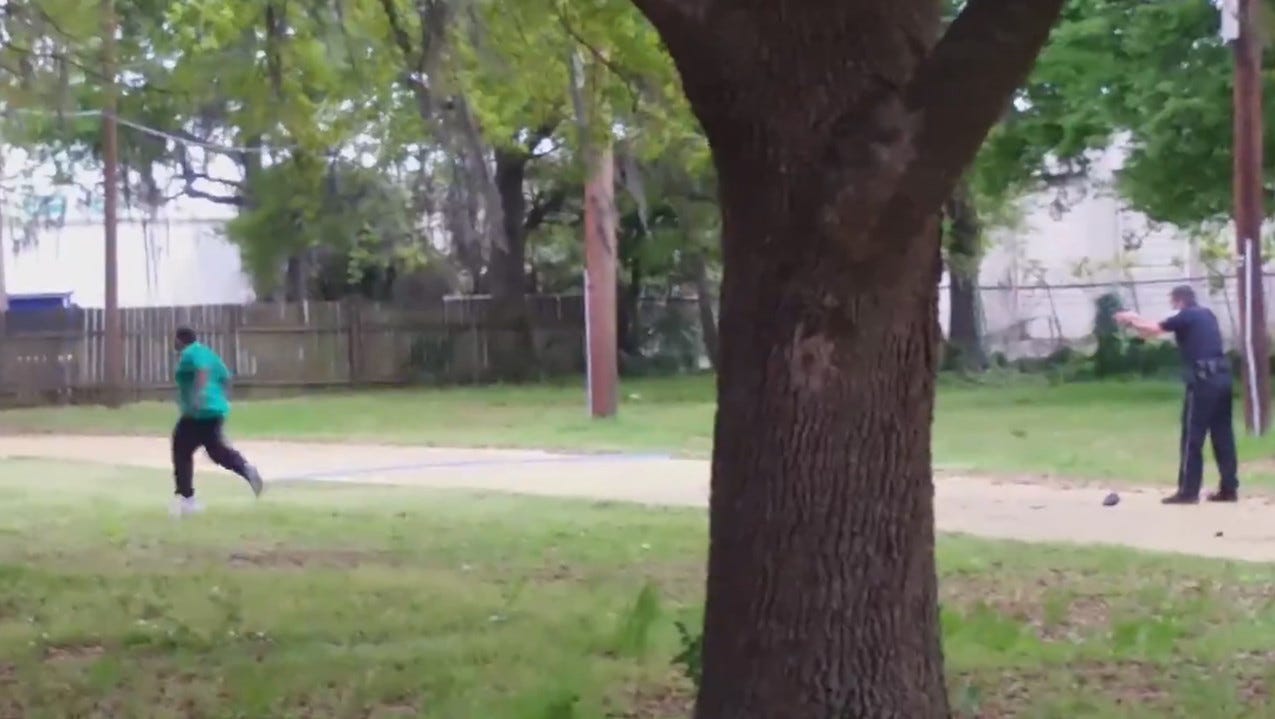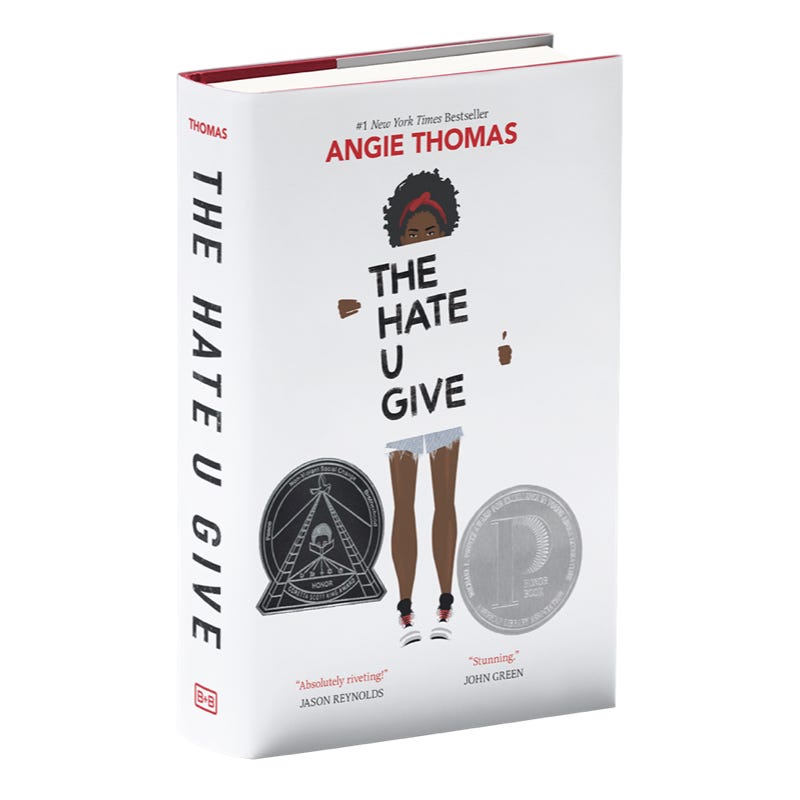Rookie Season: Debuts
Extra seasoning for your everyday food for thought
Genre: YA, Contemporary Fiction
“What’s the point of having a voice if you’re gonna be silent in those moments you shouldn’t be?”
— Angie Thomas, The Hate U Give
Back Cover (Balzer + Bray):
“Sixteen-year-old Starr Carter moves between two worlds: the poor black neighborhood where she lives and the fancy suburban prep school she attends. The uneasy balance between these worlds is shattered when Starr witnesses the fatal shooting of her childhood best friend, Khalil, at the hands of a police officer. Khalil was unarmed.”
Angie Thomas’s debut novel The Hate U Give (2017) was destined to be controversial and spark discourse—from jump—given its timely and lofty subject matter, and the author’s skill in crafting an honest and authentic account of why Black Lives Mattes, given, “There is no one way that black people speak.”
The novel started out as a senior project in college, which then expanded from a short story Thomas wrote in reaction to the police shooting of Oscar Grant.
The title was inspired by the late rapper Tupac Shakur’s philosophy of THUG LIFE—“The Hate U Give Little Infants Fucks Everybody”—a reoccurring motif interwoven through the book’s riveting chapters.
In a desperate attempt to get her debut published, Angie Thomas (who hold a BFA in Creative Writing from Belhaven University), sent a “tweet” to literary agent, Brooks Sherman, asking if he considered a YA novel inspired by Black Lives Matter to be acceptable to publishers.
His answer was a resounding “YES!” when in 2016, after a heated auction among 13 publishing houses (including the Big Five publishing houses), HarperCollins’s Balzer + Bray imprint acquired Thomas’s debut—with insider sources claiming it was a six-figure deal.1
The Hate U Give was published a year later, in 2017, and spent a remarkable 38 weeks at the top of The New York Times’ best-sellers list.2
In 2018, continuing its meteoric rise in popularity, Thomas’s novel was adapted into a critically acclaimed film from Fox 2000, starring Amandla Stenberg and directed by George Tillman, Jr.”3


“I hope none of them ask about my spring break. They went to Taipei, the Bahamas, Harry Potter World. I stayed in the hood and saw a cop kill my friend.”
— Angie Thomas, The Hate U Give
Did You Know?
Did you know that given its subject matter, The Hate U Give has consistently made the top-list of most banned books since it’s original publishing (in 2017)?
Tell Me More . . .
In fact, Katy (Texas) Independent School District superintendent Lance Hindt infamously banned the book in 2017, citing his reasoning as, “Pervasive vulgarity and racially-insensitive language . . . not its substantive content or the viewpoint expressed.”
Lance Hindt went on to state his decision was consistent with district policy and the First Amendment.4
Why Should I Care?
“Many times, as one of the few African Americans in a firm, I downplayed who I was and how I felt. I would code-switch, ignore microaggressions, and bypass things that were not professional. Why? Because I wanted to fit in.” (Barton)5
Did You Know?
Did you know, The Hate U Give describes a textbook example of code-switching?
Daily life for our teenage protagonist, Starr Carter, is about navigating two different worlds, i.e., the prep high school (Williamson) that she attends on the “rich” side of town and the Garden Heights neighborhood where she and her family live.
For Black folk in America this practice, known as code-switching, is often necessary for career advancement, but often carries an undue hardship and psychological toll.
“I once posted a picture of Emmett Till, a fourteen-year-old black boy who was murdered for whistling at a white woman in 1955. His mutilated body didn’t look human. Hailey texted me immediately after, freaking out. I thought it was because she couldn’t believe someone would do that to a kid. No. She couldn’t believe I would reblog such an awful picture.”
— Angie Thomas, The Hate U Give
See the photo Emmett Till’s mother wanted you to see. **warning: graphic
It turns out that code-switching can be seen in everyday interactions and despite what you’ve heard: everybody does it—even Presidents. (Demby)6

Sadly, for Black folk in America, code-switching is not only necessary for career advancement, but often for everyday survival, particularly when involving interactions with the police:
“We also see examples of guidelines7 encouraging black people to code-switch to survive police interactions, such as ‘acting polite and respectful when stopped’ and ‘avoiding running even if you are afraid.” (McCluney, Robotham, Lee, Smith, Durkee)8

Some Food For Thought:
“It dawned upon me with a certain suddenness that I was different from the others; or like, mayhap, in heart and life and longing, but shut out from their world by a vast veil.”
— W. E. B. Du Bois
In 1903, W.E.B. Du Bois wrote in his seminal work The Souls Of Black Folk of “double consciousness,” in attempt to describe the measure of being Black in America through the lens of white society .
For W.E.B. Du Bois and his contemporaries, even forty long years after the start of the Emancipation Proclamation (1863), being allowed to bring a “true” self was not a privilege most Black Americans could freely exercise. And still to this day, being Black in America means fighting over the right to exist—often to survive.
For me, the lasting beauty (and impact) of Angie Thomas’s novel The Hate U Give is found in Starr’s revelation that the truest version of herself is the one that brings her whole-self, and uses her voice to speak for justice for others; a justice that shines independent of worlds. A sobering reminder that the hate they give us, we do not have to return.
“We have two lives, and the second begins when we realize we only have one.”
— Confucius
T.H.U.G. L.I.F.E. (The Hate U Give) - ***warning: video contains explicit language***
Rookie Season: Debuts
A STEM Grew Petals Newsletter
Next issue is next Thursday:
11am (Pacific), 2pm (Eastern)
Like Quotes?
Follow on Instagram (at Captioned Black Art)
Made in Silicon Valley (with love) by author Jafari Joseph.
Copyright (C) 2025 My STEM Grew Petals Publishing. All rights reserved.
STEM Grew Petals is a reader-supported publication. To receive new posts and support my work, consider becoming a free or paid subscriber.





